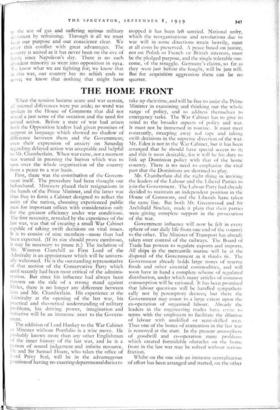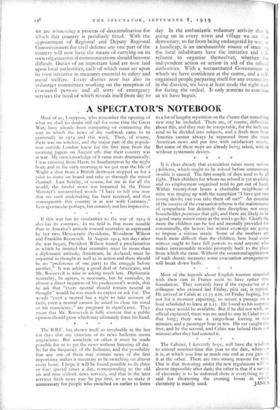THE HON 1E FRONT
When the tension became acute and war certain, all internal differences were put aside; no word was spoken in the House of Commons that did not reveal a just sense of the occasion and the need for united action. Before a state of war had arisen both the Opposition leaders had given promises of support in language which showed no shadow of difference between them and the Government; even their expression of anxiety on Saturday regarding delayed action was acceptable and helpful to Mr. Chamberlain. When war came, not a moment was wasted in pressing the button which was to turn over the whole organisation of the country from a peace to a war basis.
First, there was the constitution of the Government itself. The procedure had been thought out beforehand. Ministers placed their resignations in the hands of the Prime Minister, and the latter was thus free to form a Cabinet designed to reflect the unity of the nation, choosing experienced public men for important offices with consideration only for the greatest efficiency under_ war conditions. The first necessity, revealed by the experience of the last war, was that of creating a small War Cabinet capable of taking swift decisions on vital issues. It is to consist of nine members—more than had been expected. (If its size should prove cumbrous, it may be necessary to prune it.) The inclusion of Mr. Winston Churchill as First Lord of the Admiralty is an appointment which will be universally welcomed. He is the outstanding representative of that section of the Conservative Party which until recently had been most critical of the administration. But since his influence had always been thrown on the side of a strong stand against Hitler, there is no longer any difference between him and Mr. Chamberlain. His experience at the Admiralty at the opening of the Fast war, his practical and theoretical understanding of military problems, his driving power, imagination and initiative will be an immense asset to the Government.
The addition of Lord Hankey to the War Cabinet as Minister without Portfolio is a wise move. He probably knows more than any other Englishman of the inner history of the last war, and he is a person of sound judgement and infinite resource. l le and Sir Samuel Hoare, who takes the office of Lord Privy Seal, will be in the advantageous Position of having no exacting departmental duties to take up theirtime, and will be free to assist the Prime Minister in examining and thinking out the whole range of policy, and to address themselves to emergency tasks. The War Cabinet has to give its mind to the broader aspects of policy and war. It must not be immersed in routine. It must meet constantly, sweeping away red tape and taking swift decisions in the supreme direction of the war. Mr. Eden is not in the War Cabinet, but it has been arranged that he should have special access to it; and this is most desirable, for it will be his duty to link up Dominion policy with that of the home country. There is no need to emphasize the vital part that the Dominions are destined to play.
Mr. Chamberlain did the right thing in inviting the leaders of the Labour and the Liberal Parties to join the Government. The Labour Party had already decided to maintain an independent position in the House of Commons, and the Liberals have taken the same line. But both Mr. Greenwood and Sir Archibald Sinclair, made it plain that their parties were giving complete support in the prosecution of the war.
Government influence will now be felt in every sphere of our daily life from one end of the country to the other. The Minister of Transport has already taken over control of the railways. The Board of Trade has powers to regulate exports and imports. All ships in the mercantile marine will be at the disposal of the Government as it thinks fit. The Government already holds large stores of reserve foods and other essential commodities, and will soon have in hand a complete scheme of regulated distribution, under which many articles of common consumption will be rationed. It has been promised that labour questions will be handled sympathetically not by peremptory decrees; but there the Government may count to a large extent upon the co-operation of organised labour. Already the leaders in the engineering trades have come to terms with the employers to facilitate the dilution of labour with unskilled or semi-skilled men. Thus one of the bones of contention in the last war is removed at the start. In the present atmosphere of goodwill and co-operation many problems which created formidable obstacles on the home front in the last war may be solved without serious friction.
Whilst on the one side an immense centralisation of effort has been arranged and started, on the other we arc witnessing a process of decentralisation for which this country is peculiarly fitted. With the appointment of Regional and Deputy Regional Commissioners for civil defence any one part of the country will now have the means of carrying on its own organisation if communications should become difficult. Duties of an important kind are now laid upon local authorities, each of which 'must act upon its own initiative in measures essential to safety and social welfare. Every district now has also its volunteer committees working on the reception of evacuated persons and all sorts of emergency services the need of which reveals itself from day to
day. In the enthusiastic voluntary activity that is going on in every town and village we see that democracy, so far from being endangered by war, or a handicap, is an inexhaustible source of stren,b. the local inhabitants have the initiative and reliance to organise themselves, whether for independent action or action in aid of the official authorities. With a reconstituted Government in which we have confidence at the centre, and a selforganised people preparing itself for any eventuality in the districts, we have at least made the right start for facing the ordeal. It only remains to continue as we have begun.























 Previous page
Previous page